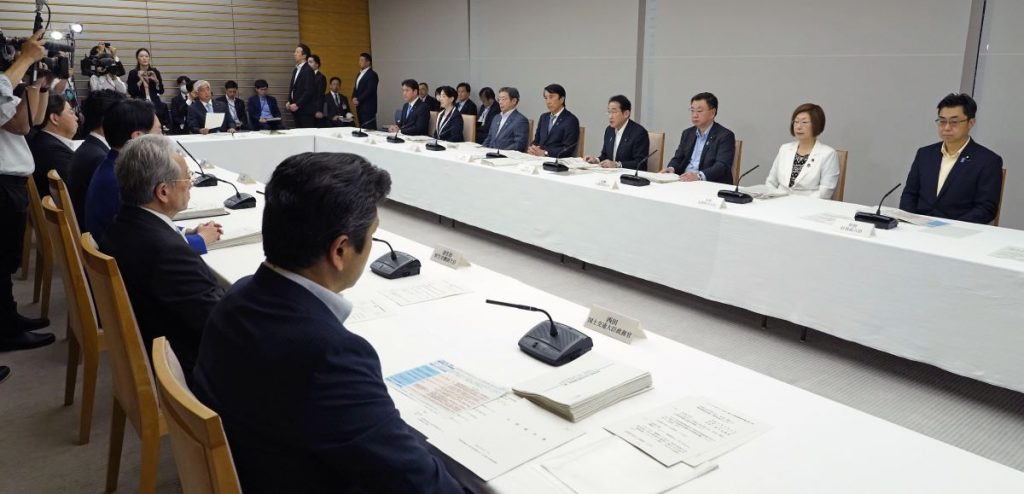No, Mr Biden! You're Wrong to Say That Japan is 'Xenophobic'
The clumsy remarks made by President Biden were incorrect and unhelpful. Japan is welcoming more immigrants than ever, a trend the government wants to continue.
May 4, 2024
By Duncan Bartlett, Diplomatic Correspondent

US President Joe Biden delivers brief remarks in the Roosevelt Room at the White House in Washington on May 2, 2024. (©Reuters/Nathan Howard)
It was an astonishing diplomatic faux pas by United States President Joe Biden to describe Japan as "xenophobic." He even bundled the country together with Russia and India as being anti-immigrant.
Such injudicious comments are inaccurate. This has the potential to cause serious damage to the US-Japan relationship.
It is particularly disappointing that the President uttered such crass comments just a few weeks after hosting Prime Minister Fumio Kishida and Japanese business leaders at a grand state dinner in Washington.
It was an astonishing diplomatic faux pas by United States President Joe Biden to describe Japan as "xenophobic." He even bundled the country together with Russia and India as being anti-immigrant.
Such injudicious comments are inaccurate. This has the potential to cause serious damage to the US-Japan relationship.
It is particularly disappointing that the President uttered such crass comments just a few weeks after hosting Prime Minister Fumio Kishida and Japanese business leaders at a grand state dinner in Washington.

Asakusa, Tokyo, is bustling with foreign visitors to Japan in August 2023. (© Sankei by Masahiro Sakai)
International Presence
Has Mr Biden realized that there are around 63,000 American citizens who are registered as foreign residents of Japan? Surely, if he had consulted members of this thriving community, he would have realized that most of them greatly appreciate the hospitality of the Japanese.
Unfortunately, Joe Biden did not do any research before speaking out. The US leader has become notorious for his loose talk. This has left some people wondering if he has lost the ability to appraise the impact of his words, perhaps as a result of his advanced age.
The president's gaffe was made at a fundraising event. Mr Biden argued that Japan, along with India, Russia, and China, would perform better economically if the countries embraced more immigration.
"You know, one of the reasons why our economy is growing is because of you and many others. Why? Because we welcome immigrants. We look to – the reason – look, think about it. Why is China stalling so badly economically? [And] why is Japan having trouble? Why is Russia? [And] India? Because they're xenophobic. They don't want immigrants," Mr Biden said, according to CNN.

International Presence
Has Mr Biden realized that there are around 63,000 American citizens who are registered as foreign residents of Japan? Surely, if he had consulted members of this thriving community, he would have realized that most of them greatly appreciate the hospitality of the Japanese.
Unfortunately, Joe Biden did not do any research before speaking out. The US leader has become notorious for his loose talk. This has left some people wondering if he has lost the ability to appraise the impact of his words, perhaps as a result of his advanced age.
The president's gaffe was made at a fundraising event. Mr Biden argued that Japan, along with India, Russia, and China, would perform better economically if the countries embraced more immigration.
"You know, one of the reasons why our economy is growing is because of you and many others. Why? Because we welcome immigrants. We look to – the reason – look, think about it. Why is China stalling so badly economically? [And] why is Japan having trouble? Why is Russia? [And] India? Because they're xenophobic. They don't want immigrants," Mr Biden said, according to CNN.

Lawmakers added nine new fields to the category of Specified Skilled Worker (ii) on June 9, 2023 (© Kyodo)
Welcoming Skilled Immigrants
In reality, the Japanese government is not opposed to immigration. It actively encourages qualified people from other countries to take up permanent residency in Japan. For those eligible, it also offers homes to their families.
There were about 600,000 high-level foreign professionals with specialized skills living in Japan in October 2023, according to the Ministry of Health, Labor and Welfare. That is more than double the 270,000 in 2018.
The Cabinet Office has appointed a special task force with the aim of attracting skilled tech workers from Southeast Asia and India. Some companies have asked their Japanese managers to ensure that the new arrivals find life easy to navigate - even if they don't speak much Japanese.
Alongside this, a scheme offering entrepreneur visas to people who want to establish businesses in Japan is thriving. It is proving particularly popular with people from Hong Kong.
Plans are also afoot to encourage thousands more immigrants to work in industries where there are currently skills shortages. This could mean opportunities for bus and taxi drivers. Immigrants may also wish to head into the woods, as the timber industry is crying out for help.

Welcoming Skilled Immigrants
In reality, the Japanese government is not opposed to immigration. It actively encourages qualified people from other countries to take up permanent residency in Japan. For those eligible, it also offers homes to their families.
There were about 600,000 high-level foreign professionals with specialized skills living in Japan in October 2023, according to the Ministry of Health, Labor and Welfare. That is more than double the 270,000 in 2018.
The Cabinet Office has appointed a special task force with the aim of attracting skilled tech workers from Southeast Asia and India. Some companies have asked their Japanese managers to ensure that the new arrivals find life easy to navigate - even if they don't speak much Japanese.
Alongside this, a scheme offering entrepreneur visas to people who want to establish businesses in Japan is thriving. It is proving particularly popular with people from Hong Kong.
Plans are also afoot to encourage thousands more immigrants to work in industries where there are currently skills shortages. This could mean opportunities for bus and taxi drivers. Immigrants may also wish to head into the woods, as the timber industry is crying out for help.

A simultaneous safety patrol of Japanese police and immigrant leaders, including community leaders such as Waqas Chikan representing the Japan Kurdish Cultural Association. November 4, 2023. (© Sankei by Kanata Iwasaki)
Charges of Racism
What about the idea that Japan is "xenophobic"?
It would have been wise for Joe Biden to have paused before using such a strong word. If he'd looked in a dictionary, he would have realized that xenophobia suggests a fear and contempt of foreigners, perhaps even a hatred of their customs.
The Encyclopedia Britannica notes that xenophobia derives from the ancient Greek words xenos, meaning stranger, and phobos, meaning fear.
A xenophobic country would be hostile to foreigners and see them as a threat. This is not the case in modern Japan.
In a post on the Quora Forum, Paul Newman, a Pole who has lived in Osaka since 2015, strongly rebuked a suggestion that Japan is xenophobic.
"I have never encountered this Japanese racism that Westerners keep talking about," wrote Newman.
Charges of Racism
What about the idea that Japan is "xenophobic"?
It would have been wise for Joe Biden to have paused before using such a strong word. If he'd looked in a dictionary, he would have realized that xenophobia suggests a fear and contempt of foreigners, perhaps even a hatred of their customs.
The Encyclopedia Britannica notes that xenophobia derives from the ancient Greek words xenos, meaning stranger, and phobos, meaning fear.
A xenophobic country would be hostile to foreigners and see them as a threat. This is not the case in modern Japan.
In a post on the Quora Forum, Paul Newman, a Pole who has lived in Osaka since 2015, strongly rebuked a suggestion that Japan is xenophobic.
"I have never encountered this Japanese racism that Westerners keep talking about," wrote Newman.
"The worst I've ever experienced was a waitress ignoring me and instead addressing my Japanese girlfriend, asking her "Does this person need a fork?" while talking about me."
Newman says that this encounter was probably due to his poor command of the Japanese language at the time. He maintains that he's never heard anyone treating him in a racist way. Neither does he think he's ever been denied work due to being a foreigner.
"There's literally nothing I can complain about when it comes to Japanese manners and attitude. If they're saying bad things about me behind my back, then I've never heard it, and it never affected me in any noticeable way," says Newman, who has 172,000 followers on Quora.

Newman says that this encounter was probably due to his poor command of the Japanese language at the time. He maintains that he's never heard anyone treating him in a racist way. Neither does he think he's ever been denied work due to being a foreigner.
"There's literally nothing I can complain about when it comes to Japanese manners and attitude. If they're saying bad things about me behind my back, then I've never heard it, and it never affected me in any noticeable way," says Newman, who has 172,000 followers on Quora.

White House Press Secretary Karine Jean-Pierre speaks during the daily press briefing in the James S. Brady Press Briefing Room at the White House in Washington on May 1, 2024. (© Reuters)
Press Headache
In Washington, it was down to Joe Biden's long-suffering press secretary Karine Jean-Pierre to try to prevent the President's remarks from causing too much of a furor.
She said her boss was attempting to make a larger point when he described Japan and India as "xenophobic."
"He was saying that when it comes to who we are as a nation, we are a nation of immigrants, that is in our DNA," she told reporters on board Air Force One.
It is not in the interest of Japan or India to stir up too much of a fuss about an off-the-cuff remark made by the President at a Democratic Party fundraiser.
Nevertheless, it would be appreciated if the US leader would show Japan an appropriate level of respect. That would include taking into consideration the respectful attitude of the Japanese towards foreigners.
Press Headache
In Washington, it was down to Joe Biden's long-suffering press secretary Karine Jean-Pierre to try to prevent the President's remarks from causing too much of a furor.
She said her boss was attempting to make a larger point when he described Japan and India as "xenophobic."
"He was saying that when it comes to who we are as a nation, we are a nation of immigrants, that is in our DNA," she told reporters on board Air Force One.
It is not in the interest of Japan or India to stir up too much of a fuss about an off-the-cuff remark made by the President at a Democratic Party fundraiser.
Nevertheless, it would be appreciated if the US leader would show Japan an appropriate level of respect. That would include taking into consideration the respectful attitude of the Japanese towards foreigners.
Author: Duncan Bartlett, Diplomatic Correspondent
Mr Bartlett is the Diplomatic Correspondent for JAPAN Forward and a Research Associate at the SOAS China Institute. Read his other articles and essays.
No comments:
Post a Comment